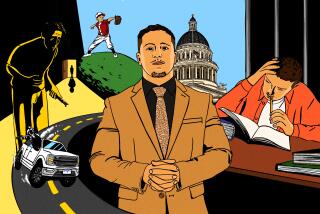Kava Tea DUI Case Puts Spotlight on Community Steeped in Tradition
- Share via
SAN MATEO, Calif. — In the predawn gloom of an empty roadside in this suburban city south of San Francisco, modern American life collided with ancient Tongan tradition and wound up in court.
Taufui Piutau, a native of Tonga, was cited for driving under the influence--of kava tea, a legal substance widely used in Polynesian social rituals.
When San Mateo County prosecutors charged the 47-year-old man with drunk driving last week, they set off a furor that touches on legal questions, social issues, Tongan tradition and organic chemistry.
“It’s the first time someone in the state of California has been charged with driving under the influence of kava,” said Stockton attorney Scott Ennis, who is representing Piutau. “Kava is not illegal. This is nuts--it’s just crazy.”
Prosecutors said they spent nine months researching kava and its effect on motor skills before filing the misdemeanor charge against Piutau.
“I have no idea what kava is, but it affected his driving,” said San Mateo County Dist. Atty. Jim Fox. “Our understanding from expert witnesses is that kava has hallucinogenic properties, and it’s clear that that effect impairs an individual’s ability to drive.”
The saga began in August, as Piutau drove home at 3 a.m. from his church’s kava circle. The social ceremony, in which cups of kava tea are dipped from a communal bowl, had lasted about six hours.
California Highway Patrol officers who stopped Piutau said he was weaving between the lanes of U.S. 101. Piutau allegedly failed a sobriety test, but tested negative for alcohol and drugs.
He told investigators that he had drunk about eight cups of kava tea, according to the CHP. The active ingredients of the tea, which is made from the root of a plant called piper methysticum, are called kavalactones, and they act on the brain to produce a calming effect. Now popular in the United States, kava is available in many forms and strengths.
Ennis said his client wasn’t drunk; he was simply exhausted from the late hour and from sitting cross-legged in a circle for so long.
California law covers driving under the influence of anything that might affect the brain, muscles or central nervous system and could prevent the driver from safely operating a motor vehicle, Fox said. Within a week of his arrest, Piutau was suspended without pay from his delivery job at United Parcel Service.
The exotic case has made international news. Ennis has received calls not only from local newspapers, but also from “Good Morning America,” “Dateline NBC,” “Extra,” National Public Radio, CBS Radio commentator Charles Osgood and the German wire service Deutsche Presse-Agentur.
“Taufui is shell-shocked; he got arrested, he lost his job and now he’s going to trial,” Ennis said. “He has exposed himself to the public much more than he ever thought he would, and he just doesn’t understand.”
Cultural differences have complicated the matter, experts in the South Pacific say. Tonga, a tiny island nation ruled by a king, has a complex network of social strata in which the kava ceremony plays a central role.
“Kava is culturally significant and plays a major role in how people formalize certain celebrations--for example, the installment of a noble title,” said Emeline Uheina Tuita, consul general of Tonga who serves the 8,000 Tongans in the Bay Area. “In the traditional culture, the event is not really formalized until the kava ceremony is held, with the king at the head of the kava circle.”
Hillary Rodham Clinton, Pope John Paul II, President Lyndon B. Johnson and Queen Elizabeth II have been feted with kava ceremonies.
The kava circle often takes on increased importance to expatriate Tongans eager to maintain cultural ties with their homeland, Tuita said. Bay Area Tongans rely on church networks for moral and social support, and kava circles like the one Piutau attended are common.
Also common is the Tongan respect for authority.
“They come from a culture where there is awareness and respect for people of a higher rank. It’s an integral part of their lives,” said Janet Hoskins, professor of anthropology at USC. “Whatever [Piutau] said to the CHP officers was most likely respectful, and he probably answered all their questions fully--perhaps too fully for his own good.”
Definitive answers about kava are hard to come by. Although it is among the herbal remedies that have become popular recently, information about it is scarce. The lack of standardized measurements makes it difficult to know how much of the active ingredient the various kava teas, infusions and tinctures contain.
“This is an agent that just hasn’t been studied the way chemical synthetic agents have been studied,” said Michael Wincor, associate professor of clinical pharmacology at USC. “We don’t know how much is too much, although we do know that taking too much is certainly a possibility.”
The consul general agreed. “It is possible that kava can impair your ability to drive, so it concerns me. I would not endorse saying, ‘Hey, listen, this is social activity; leave it alone,’ ” she said. “But I wouldn’t like to see it banned either. I think people must become aware, and they must be careful.”
Piutau has a temporary job at a warehouse and is awaiting his June 26 trial. If convicted, he faces up to six months in jail and a $500 fine.
More to Read
Sign up for Essential California
The most important California stories and recommendations in your inbox every morning.
You may occasionally receive promotional content from the Los Angeles Times.













